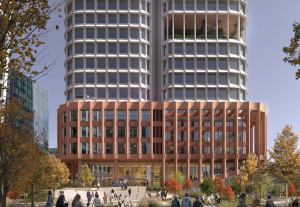
John F Hunt takes on complex Euston Tower deconstruction
John F Hunt has been appointed by British Land under a pre-construction services agreement to deliver the demolition and deconstruction package for the redevelopment of London’s Euston Tower. The contractor previously carried out the soft strip of the 36-storey building in 2024 and will now dismantle the structure while retaining its reinforced concrete core, which will stand at its full height of 126 metres. The decision to preserve the lift-and-stair core forms a central part of the redevelopment strategy. To facilitate the safe removal of the surrounding structure, John F Hunt’s engineering consultancy, RKD, has designed a complex temporary works solution to stabilise and strengthen the core as it becomes free-standing. The engineering challenge is significant, with the retained core expected to be one of the tallest of its kind in London. RKD director Mark Blackmore said the team would work closely with British Land’s engineers, Arup, throughout the design process. He described the scheme as potentially the first in London to engineer a 126-metre core to remain free-standing, highlighting both the complexity and technical innovation involved. In a departure from traditional demolition methods, John F Hunt will replace the standard scaffold envelope used for perimeter protection with hydraulic frame technology. A six-storey Climbing Protection Screen will be installed at upper floor levels, providing safe access and reducing operatives’ exposure to working at height. The bespoke, automated system will descend progressively as the demolition advances. Although the existing foundations are being retained, the basement will be extended to accommodate the increased footprint of the new building, which will grow from 350,000 sq ft to 550,000 sq ft. Basement works, piling and the construction of the new ground floor structure will proceed while deconstruction continues several metres above. Mace is acting as main contractor on the £600m redevelopment. Glen Clark, managing director of John F Hunt’s London business, said the project presented significant technical challenges and underlined the value of early engagement and collaboration in delivering a solution focused on safety, sustainability and programme certainty. Building, Design & Construction Magazine | The Choice of Industry Professionals

Fusion 360 urges businesses to ‘act now’ to avoid global rise in cost of solar PV panels
Specialist electrical and solar panel contractors, Fusion 360 Group, have urged businesses to secure their solar energy systems before an anticipated rise in cost in April. Driven by global supply chain issues and material shortages, solar PV (photovoltaic) markets have announced that the price of solar panels in the UK will go up from April 1st. “Commercial, industrial, housing and public sectors looking to invest in solar energy are best to act now. Delaying projects could mean paying more for panels, incurring longer lead times and potentially disrupting any sustainability targets for your business” says Joanne Skinner, Commercial Director of Fusion 360. The upcoming solar panel availability and cost changes are reportedly driven by a reduction in Chinese manufacturing subsidies, global supply chain constraints and surging material costs, including silver and polysilicon. Leading solar energy installers, like Fusion 360, have suggested that securing solar panels before the price rise in April ensures the project can remain in budget and on schedule “These price rises have been anticipated for some time, so we’ve been proactively working with businesses to help them secure the hardware required for their solar energy systems. Until April, we’re able to offer the opportunity to lock in better pricing, guarantee availability and ensure their solar panels are delivered and installed on time” adds Joanne. Established in 1997, Fusion 360 – formerly Fusion Electrics – specialise in managing the supply and installation of electrical and energy systems for business and domestic customers throughout the UK. With a dedication to safety, innovation and long-term value for clients, Fusion has supported the design and installation of solar energy systems that power businesses and properties with clean, renewable energy. “Whether you’re cutting energy costs, improving green credentials or looking to become more energy independent – solar energy is a smart, long-term sustainable investment. And, with this month being the best time to act, our services will be available for businesses and organisations across the UK” concludes Joanne. Read more about Fusion 360: https://fusion360group.co.uk/ Building, Design & Construction Magazine | The Choice of Industry Professionals

International Women’s Day: Taylor Wimpey East Anglia celebrates women in construction
This year’s International Women’s Day encourages everyone to ‘Give to Gain’, and Taylor Wimpey East Anglia is highlighting the inspiring and collaborative career journeys of Hollie-Jayne Bennett, Assistant Site Manager and Rhianna Darling, Trainee Assistant Site Manager. ‘Don’t hesitate to throw out an idea’ and ‘no question is a silly question’ are the two valuable lessons Hollie-Jayne Bennett says she has learnt since starting a role as Assistant Site Manager at Taylor Wimpey’s Lantern Croft development in Ely. Originally starting her career in the housebuilding industry as a painting and decorating apprentice, Hollie-Jayne grasped the opportunity to begin her management pathway. Joining Taylor Wimpey as an Assistant Site Manager in August 2022, Hollie-Jayne has multiple qualifications in site management and supports the Site Manager with the day-to-day running of the development and always keep health and safety at the forefront. Hollie-Jayne said: “I thoroughly enjoy site work and everything it entails. I love coordinating with contractors and producing an incredibly high-quality product for Taylor Wimpey customers to enjoy. It’s rewarding to see a development progress from the early stages through to a completely new community, knowing the work that the team has put in to create homes that people are proud of. “I do feel like I’m breaking down barriers within the industry, being a female in a leading position. Being a woman isn’t something that phases me about my role. Developing confidence is a process, but through hard work and gaining experience, you can strengthen your belief that you bring value to the table. In the next five years, I hope to become the first female Site Manager in the East Anglian region.” Having formerly been a sales coordinator and a director’s PA within the housebuilding industry, Rhianna Darling’s entry into working on site was unconventional. Rhianna joined Taylor Wimpey six months ago and is currently a Trainee Assistant Site Manager at Northfield View in Stowmarket. Her role is to support the Site Manager in ensuring the smooth operation of the development to maintain the build schedule, including coordinating with contractors and ensuring that materials are delivered and ordered on time. “I gained valuable experience within sales and as a PA, but there wasn’t much opportunity for me to progress. I realised after speaking with my colleagues that my coordination, organisation and management skills were transferable to a role on site. Curiosity combined with support from my colleagues and a willingness to step out of my comfort zone helped me transition into my current role.” “No two days are ever the same, which is something I really enjoy. I love being out on site, seeing the progress day by day and knowing I’ve played a part in bringing someone’s dream home to life. Having such a wonderful, tangible achievement paired with the happiness of a family on move-in day is so rewarding.” International Women’s Day (IWD), which takes place on the 8th March 2026, is an opportunity for the world to come together to forge gender equality. 2026’s theme is Give to Gain, which encourages a mindset of generosity and collaboration. For more information on careers at Taylor Wimpey, please visit: https://www.taylorwimpey.co.uk/jobs/jobs-you-can-do/construction Building, Design & Construction Magazine | The Choice of Industry Professionals

Hazardous lighting for L’Oréal NZ hub
When global beauty leader L’Oréal set out to develop its new distribution centre in Auckland, New Zealand, the brief extended far beyond operational efficiency. The Dangerous Goods Store within the facility required a robust, compliant lighting solution for a Zone 2 hazardous environment, while also contributing to a sustainability ambition that would ultimately make history in New Zealand. Delivered in November 2025, the project brought together a strong collaboration team: developer James Kirkpatrick Group, architect Gravitas Consulting, builder Waide Commercial Construction, and Electrical and Lighting Consultant Electrical Consulting Services. Electrical Consulting Services, in collaboration with Techlight, was entrusted with delivering a lighting solution that would meet stringent safety, performance, and environmental benchmarks. There was only one manufacturer they wanted to partner with, Petrel. Designing for Zone 2: Safety Without Compromise The Dangerous Goods Store was classified as Zone 2, an environment where explosive gas atmospheres are not likely to occur in normal operation, and, if they do occur, will exist only for a short time. In such settings, lighting is not merely functional; it is critical infrastructure. To address this, 73No Petrel ALED4/G/Z2/156E luminaires were installed as high-bay fittings, illuminating aisles and open warehouse areas with powerful, consistent light output. These fixtures are engineered specifically for hazardous locations, providing the necessary ingress protection, durability and compliance for Zone 2 applications. Their robust construction ensures long-term reliability while minimising maintenance requirements, an essential consideration in environments handling dangerous goods. Complementing the general lighting, 12No Petrel 9LED5700/EM units were deployed to provide emergency illumination across aisles and open areas. In any hazardous facility, emergency lighting must operate seamlessly in the event of power failure, ensuring safe evacuation and maintaining visibility during critical incidents. The integration of dedicated emergency luminaires reinforces the project’s uncompromising approach to safety. Supporting a 6-Star Green Star Milestone While safety and compliance were paramount, sustainability remained central to the project vision. The distribution centre has achieved New Zealand’s first-ever 6-Star Green Star Design Certified rating, the highest possible rating awarded by the New Zealand Green Building Council. This world-leading certification represents excellence in sustainable design and places the facility at the forefront of environmentally responsible industrial development in New Zealand. Commenting on the project, Stuart Head, Technical and Certification Manager at Petrel Ltd said “Lighting is central to Green Star performance, influencing energy use, operational carbon and overall environmental quality. By combining high-performance LEDs with precise optical control, the L’Oréal Dangerous Goods Store achieves lower emissions, reduced energy demand and safer working conditions. Petrel is proud to have supported the delivery of this award-winning outcome.” By combining hazardous-area compliance with energy-efficient design, Petrel’s solution demonstrates that performance and sustainability are not mutually exclusive; they are mutually reinforcing. Collaboration Driving Innovation Projects of this calibre depend on close collaboration between stakeholders. Early engagement with the end user, developer, design consultants and construction team ensured that lighting specifications aligned seamlessly with architectural intent, structural constraints, electrical and fire suppression infrastructure. The result is a facility that not only meets stringent hazardous-area standards but also aligns with global best practice in sustainable industrial design. Techlight’s National Sales Manager, Pierre Abrahamse, said: “The L’Oréal Dangerous Goods Store project sets a new benchmark, demonstrating how specialist lighting capability can drive both operational excellence and environmental leadership. Credit goes to the team at Petrel for their skill, commitment and genuine passion for the sector.” In an era where supply chain infrastructure must be safer, smarter and greener, this Auckland facility sets a new global standard. Through thoughtful design, precision engineering and collaborative delivery, it proves that even the most technically demanding environments can achieve world-class sustainability outcomes. To learn more about this story and the products featured, please visit Petrel’s website. Building, Design & Construction Magazine | The Choice of Industry Professionals

When Business Leaders Need a Criminal Defense Attorney
Business leaders often face heavy responsibilities that extend beyond managing profits and people. With so much at stake, they can sometimes find themselves dealing with criminal allegations that threaten both their freedom and their company’s reputation. These legal issues may involve financial misconduct, workplace incidents, or even accusations tied to criminal law, such as drug crimes or domestic violence. A criminal record can damage not only personal credibility but also the trust investors and employees place in a company. Knowing when to seek a criminal defense attorney is essential for protecting both career and business. Why Criminal Charges Happen Running a company means making complex decisions, and mistakes can lead to serious consequences. Leaders may face drug charges if employees are caught with drug possession on company property, or they may be accused of gun charges if weapons are found in violation of workplace rules. In other cases, misdemeanor charges like simple assault could arise from conflicts in the workplace. Criminal law covers a wide range of situations, and business leaders aren’t immune. For example, a chief executive might face accusations of fraud if financial statements mislead investors. A manager could be investigated if police reports show safety violations that harmed employees. Even unintentional errors can result in criminal allegations, which is why leaders must stay alert to the risks tied to their positions. What a Criminal Defense Attorney Does Consulting with criminal lawyers in Brisbane or nearby helps clients understand their constitutional rights and guides them through investigations. They explain defense strategies, review police reports, and prepare responses to charges. For business leaders, this support is critical because the consequences can include prison, fines, or license suspension that affects their ability to run a company. Attorneys also handle cases that go beyond corporate matters. They may defend leaders accused of drug trafficking, domestic violence, or other serious crimes. In each situation, the attorney works to challenge evidence, negotiate plea bargains, and bring in expert witnesses when needed. Without this guidance, leaders may struggle to protect themselves and their businesses. Protecting Reputation and Business Interests Reputation is often as valuable as financial success. Criminal allegations can quickly erode trust among investors, employees, and customers. Even before a trial begins, media coverage can harm the company’s image. Defense attorneys help manage these risks by advising on communication strategies and ensuring legal responses are carefully planned. For example, if an executive is accused of drug crimes or fraud, the attorney may coordinate with public relations teams to release statements that protect credibility while avoiding legal missteps. This balance between defense and reputation management is vital for long‑term survival. Common Situations That Call for Legal Help Several scenarios show when business leaders should seek immediate legal counsel: These examples show that criminal defense isn’t limited to traditional corporate crimes. Modern business creates new risks that leaders must be ready to handle. Why Acting Quickly Matters Timing makes a huge difference in criminal cases. Waiting too long to seek legal help can weaken a defense. Investigators may already be gathering police reports, interviewing witnesses, and building a case before charges are filed. Leaders who consult an attorney early can respond proactively instead of waiting for problems to grow. For instance, if a company is under investigation for tax fraud or drug trafficking, waiting until charges are filed may leave little room to negotiate or correct mistakes. Early involvement of a defense attorney allows for clarification, cooperation with authorities, and sometimes avoiding charges altogether. Balancing Leadership and Legal Defense Leaders can’t simply step away from their duties when facing legal challenges. They must continue guiding their organizations while preparing their defense. This balance requires careful planning. Attorneys often work with leaders to minimize disruptions. They may schedule meetings outside business hours or coordinate with in‑house legal teams. This way, leaders can keep their focus on operations while still preparing for their defense. Managing both responsibilities shows why professional legal support is so important. Conclusion Criminal charges against business leaders are serious matters that can affect both personal freedom and company stability. From drug charges and domestic violence to gun charges and misdemeanor charges, the risks are wide‑ranging and complex. A criminal defense attorney provides essential guidance, helping leaders protect their constitutional rights, reputation, and business interests. Acting quickly and strategically can make the difference between a damaging conviction and a manageable resolution. For any leader, knowing when to seek legal help isn’t just smart—it’s necessary for protecting both career and company.

Barbican set for £231m retrofit as landmark arts centre overhaul wins consent
A £231m transformation of London’s Barbican Arts Centre has secured planning and listed building consent, paving the way for a comprehensive retrofit of one of the UK’s most recognisable post-war cultural landmarks. Approval from the City of London Corporation enables long-awaited works to address ageing building fabric, accessibility constraints and outdated infrastructure across the Grade II-listed Brutalist complex. The project has been designed by Allies and Morrison in collaboration with Asif Khan Studio and engineer Buro Happold. Crucially, the scheme is entirely retrofit-led. No additional floorspace will be created. Instead, the focus is on repairing, upgrading and optimising the existing structure, preserving the character of the 1980s arts centre while bringing it up to modern standards. A central element of the plans is the full refurbishment of the Barbican Conservatory. Long-standing maintenance issues will be resolved and a new climate-controlled environment introduced to safeguard plant life. A new lift and stair will open up the raised balconies for the first time, creating publicly accessible viewing areas and improving circulation. Accessibility improvements run throughout the wider building. A new lift in the Conservatory will provide step-free access to the fly tower for the first time, while a second lift in the main foyer will enhance routes to the Concert Hall and Theatre. The scheme also includes upgraded wayfinding, additional toilet facilities and a new multi-faith room. Externally, the lakeside terrace and foyers will undergo a careful, sustainability-led upgrade. Original materials, including glazing and paving within the Conservatory, will be retained and reused wherever possible to minimise embodied carbon and protect the integrity of the Brutalist design. The conservation-led approach has received backing from national heritage bodies, including Historic England and the Twentieth Century Society. The City of London Corporation has committed £191m towards Phase 1 of the programme, with further funding to be raised through philanthropy and partnerships. Major on-site works are scheduled to begin in 2027. Between June 2028 and 2029, most Barbican activity will pause to enable the most intensive phase of construction, although Cinemas on Beech Street will remain open and programming will continue with resident partners such as the London Symphony Orchestra and the Royal Shakespeare Company. Opened in 1982 by Queen Elizabeth II, the Barbican welcomes more than one million visitors each year. The approved scheme is intended to secure the building’s fabric, accessibility and cultural relevance for at least the next half century. Building, Design & Construction Magazine | The Choice of Industry Professionals

